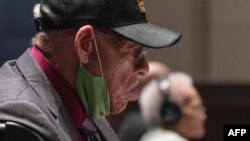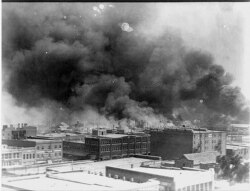Three Black centenarians who survived one of the deadliest US race massacres appealed to Congress for justice Wednesday after a lifetime of pain triggered by a 100-year-old tragedy only now coming to light for many Americans.
In gripping testimony, 107-year-old Viola Fletcher, the oldest living survivor of the Tulsa, Oklahoma, massacre of 1921, recalled the horrors of the attack -- and how she and others were left behind by a nation she accused of burying the past.
"No one cared about us for almost 100 years. We and our history have been forgotten, washed away," she told a rapt House Judiciary Committee hearing.
Fletcher, wearing wire-rimmed glasses, pearl earrings and with her white hair cropped short, said it was her first-ever trip to the US capital.
"I'm here asking my country to acknowledge what happened in Tulsa in 1921," she said.
Fletcher, who dropped out of elementary school and suffered decades of poverty working mostly as a housekeeper for white families, said she has "lived through the massacre every day" for the past century.
The Tulsa carnage, in which up to 300 African Americans were killed on May 31 and April 1, 1921 when white mobs torched the Black neighborhood of Greenwood, remains a sensitive issue.
As one of America's most successful Black enclaves, Greenwood was known at the time as "Black Wall Street." Much of it was burned to the ground in an unprecedented convulsion of racial violence that left thousands homeless.
"I still see Black men being shot, Black bodies lying in the street.... I still see Black businesses being burned. I still hear the screams," Fletcher testified.
"Our country may forget this history, but I can not. I will not, and other survivors do not, and our descendants do not."
Reparations were never paid to the families who lost their homes or businesses, and perpetrators of the violence were never charged.
One hundred years later, the city of 400,000 -- which is about 15% Black -- is still divided.
Last year, then-president Donald Trump enflamed tensions when he held a campaign rally in Tulsa on Juneteenth, the unofficial holiday marking the end of slavery in the United States.
Trump made no mention of Juneteenth or the massacre.
'White men with guns'
Fletcher's 100-year-old brother, Hughes Van Ellis, who was an infant when the burning and killing occurred, testified that surviving Black families were left with nothing, cast out as refugees in their own country.
"We are asking for justice for a lifetime of ongoing harm," said Van Ellis, a U.S. Army veteran who fought in World War II.
"Give us a chance to be made whole," he added. "Please do not let me leave this Earth without justice."
In 2001 a commission created to study the tragedy concluded that Tulsa authorities themselves had armed some of the white rioters.
The commission recommended that Greenwood residents and their descendants be compensated, but the effort failed.
Damario Solomon-Simmons, executive director of the Justice For Greenwood Foundation, told Congress that Tulsa and Oklahoma authorities have treated the tragedy as "nothing more than a shameful secret that the city fathers hoped would fade with time."
But it has not been forgotten, and the long fight for justice is "ongoing," he said.
With the 100th anniversary of the massacre now days away, some House Democrats are reviving calls for reparations.
Congressman Hank Johnson announced he was introducing legislation creating a federal system of action for claims related to the Tulsa massacre.
"If we don't learn from history, we're doomed to repeat it," the House panel's chairman Steve Cohen said, adding that many Americans today "sadly" are unaware that the massacre occurred.
Lessie Benningfield Randle, 106, said she recalls how "white men with guns came and destroyed my community" of Greenwood a century ago.
She quickly pivoted to the present, saying in an emotional plea to lawmakers that "I have waited so long for justice."
"We are tired," Randle said. "I am asking you today to give us some peace."













